India still has one of the lowest divorce rates in the world, but marriage breakdowns are becoming more common.
Experts say most cases of divorce in India are filed on the grounds of abuse, or what's legally termed as "cruelty". But what amounts to abuse has long been open to debate, especially when determining whether psychological trauma has been afflicted on a person during marriage.
The Supreme Court has said there cannot be any "strait-jacket formula or fixed parameters for determining mental cruelty in matrimonial matters".
Because of its wide legal definition, Indian courts have had to rule on a host of bizarre interpretations of what constitutes non-physical abuse. Atish Patel shares a few of the more unlikely examples.

Party pooper

Last week, the Bombay high court overturned a family court ruling from 2011 that granted divorce to a sailor who claimed his wife's regular partying, among other things, was a form of abuse.
The court observed that the 42-year-old man, who married his wife in 1999, was also in the "habit of enjoying parties", and therefore could not conclude that the woman had subjected the man to cruelty, either physically or mentally.
"He is not entitled for a decree of divorce on the ground of cruelty," the court said.
While overturning the lower court's ruling, Bombay high court Justice ML Tahaliyani noted: "Socialising to some extent in the present society is permissible."

Sex machine

A sexless marriage is a common trigger for divorce globally. But last year, a man in Mumbai (formerly known as Bombay) wanted to divorce his wife because of too much sex.
In his petition, the man described his wife as having an "excessive and insatiable appetite for sex" ever since their marriage in April 2012, according to a report by the Press Trust of India news agency.
He alleged that she would force him to have sex, even at times when he was sick, and threatened to sleep with other men when he refused.
He said his wife's "cruel behaviour" and her "adamant, aggressive, stubborn and autocratic" nature had made it difficult for him to live with her.
Last year a family court in Mumbai ruled in the husband's favour and granted a divorce after his wife failed to appear before the court, with the husband's evidence remaining unchallenged, the news report said.

Fashion police

In another case, a man sought a divorce from his wife on the grounds of cruelty in part because of her dress sense.
The man, in his 30s and married since 2009, was reportedly anguished by his wife's decision to often wear shirts and trousers to her workplace instead of traditional Indian clothing.
A family court passed a divorce order three years ago, but in March last year, the Bombay high court overturned it.
"The door of cruelty cannot be opened so wide, otherwise divorce will have to be granted in every case of incompatibility of temperament," the court ruled.

Acne 'trauma'

Arranged marriages remain common in India but the reason one man gave for wanting to end his union was far from usual - he complained of being traumatised by his wife's acne problem.
In his divorce petition, he argued that the pimples and boils on his wife's face prevented him from consummating their marriage during their honeymoon in 1998.
Ruling in favour of the husband in 2002, a family court in Mumbai said the "repulsive condition of the wife is undoubtedly tragic for the wife but this is traumatic for the spouse".
The court added: "The woman played a fraud on him by not disclosing the fact that she had a [skin] disease."
The ruling came despite the wife's doctor telling the court her skin condition was treatable and would not negatively affect their sex life.
Although skin diseases like acne are not legally recognised as grounds for divorce, under India's Hindu Marriage Act - which applies to 80% of the country's population who consider themselves Hindu - leprosy or a "venereal disease in a communicable form", including HIV-Aids or hepatitis B, can be grounds to end a marriage.

'Hostile hospitality'

Going back even further, in 1985 the Allahabad high court in an appeal hearing upheld a lower court's decision that the refusal by a woman to make tea for her husband's friends had left him humiliated and along with other factors, including her decision to terminate a pregnancy without his knowledge, amounted to mental abuse and acceptable grounds for divorce.